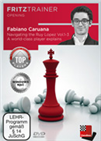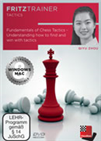One round to go
 Twelve days of the first online super-tournament have gone by, and it already seems normal to see top players in real time thinking in front of a computer screen from four different — and many times distant — spots in the world. The event will come to an end on Sunday, when the winners of Friday's and Saturday's semi-finals will fight for the US$70,000 first prize.
Twelve days of the first online super-tournament have gone by, and it already seems normal to see top players in real time thinking in front of a computer screen from four different — and many times distant — spots in the world. The event will come to an end on Sunday, when the winners of Friday's and Saturday's semi-finals will fight for the US$70,000 first prize.
With one round still to go in the round-robin section, the four players that will battle it out in the deciding knockout are already known. Thursday's round seven — when four matches will be played simultaneously for the first time — will nonetheless decide the final placings in the standings table. The standing of each of the top four will determine the pairings for the semi-finals, while those placed fifth to eighth will directly fight for prize money.
The one player from the bottom half of the standings that still had a chance to catch up with those above him before Wednesday's matches was Maxime Vachier-Lagrave. The French grandmaster needed to beat Fabiano Caruana in the rapid section (i.e. get three match points) to remain in contention. After a loss in game one and a draw in the second encounter, he was already in a must-win situation in game three. He had a superior position at some point, but ended up losing that game as well, giving Caruana match victory right there and then.
In the other clash of the day, Hikaru Nakamura and Ding Liren drew all their rapid games and went to sudden-death. Nakamura played black and won the Armageddon decider to catch up with Carlsen and Caruana in the lead.
 The Ruy Lopez is one of the oldest openings which continues to enjoy high popularity from club level to the absolute world top. In this video series, American super GM Fabiano Caruana, talking to IM Oliver Reeh, presents a complete repertoire for White.
The Ruy Lopez is one of the oldest openings which continues to enjoy high popularity from club level to the absolute world top. In this video series, American super GM Fabiano Caruana, talking to IM Oliver Reeh, presents a complete repertoire for White.
Caruana 2½:1½ Vachier-Lagrave
When this match finished, in a conversation between Caruana and the commentary team, it was noted that Vachier-Lagrave did not have a very good outing at the Invitational. After all, the Frenchman came from surprisingly being called to play in the Candidates, getting prepared very quickly, doing a good job at the event and suddenly having to return home amid the coronavirus crisis — not a breezy series of events, certainly.
In game one, 'MVL' got in trouble with black in the middlegame and, pressured by his opponent, faltered decisively on move 44:
 What’s the easiest way to win a chess game? We all know finding a good tactic in a game can let you win a point immediately. Therefore, Fundamentals of Tactics is an excellent choice for you if you wish to learn how to start finding tactics in your games!
What’s the easiest way to win a chess game? We all know finding a good tactic in a game can let you win a point immediately. Therefore, Fundamentals of Tactics is an excellent choice for you if you wish to learn how to start finding tactics in your games!
After 44...Qf4, White's queen and knight duo is too strong for Black — 45.Qc8 Qf1+ 46.Ka2 Qc4+ 47.Ka3 and Black resigned.
Caruana got some chances in game two, but the evaluation never veered away from relative equality until the point was split. In game three, Vachier-Lagrave got a strong initiative:
The commentators thought Vachier-Lagrave would (correctly) sacrifice one of his knights in this position — either on g3 or f2 — but France's number one strangely stepped back with 28...Ngf6. Some five moves later Caruana got the upper hand, but he could not get more than a queen ending a pawn up, always a difficult edge to convert into a win, particularly in a rapid game. The world number two finally managed, however, securing match victory.
The ever-fighting Vachier-Lagrave knew he was out of contention but nevertheless ended the match with a victory. Caruana caught up with Carlsen in the standings table, and was later asked whether his choices over the (digital) board are somehow affected by the fact that the Candidates Tournament will probably be resumed at some point in the future. He replied:
I completely forgot about the Candidates already. I know it'll happen, but I'm not thinking about it whatsoever.
The American pointed out that preparing for such a strong event is highly stressful, adding that Vachier-Lagrave's situation — i.e. finding out he would participate shortly before the start of the event — was favourable in that he did not arrive in Yekaterinburg with so much accumulated stress, being able to feed off the "good emotions" exclusively.
Select an entry from the list to switch between games
Nakamura 2:2 Ding
This was only the second match of the tournament to end with all rapid games drawn — in round three, Ding drew four times with Vachier-Lagrave before winning the Armageddon tiebreaker. It was also a high-quality encounter chess-wise, with Peter Svidler later praising Nakamura:
Your match I think is the closest we've had in this tournament so far to an over-the-board match between the same players, in terms of opening choices. [...] I think it was very well played.
In games one and two, the player with white did not make the most of his winning chances, with Nakamura either missing or choosing not to gain an exchange in the first encounter:
 The odd-looking move 5….Qe7 is an ideal surprise weapon against the Exchange Variation of the Ruy Lopez. Robert Ris takes a look at possible variations.
The odd-looking move 5….Qe7 is an ideal surprise weapon against the Exchange Variation of the Ruy Lopez. Robert Ris takes a look at possible variations.
The five-time US champion played 38.Qxe5 here, instead of 38.Qh4, when Black either immediately gives up the exchange with 38...Rxg6 or allows 39.Ne7 after retreating his bishop. In the game, 'Naka' got a more comfortable position with the better minor piece, eventually getting an exchange for a pawn anyway, but that was not enough to get the full point.
In game two, it was Ding's turn to waste his chances with the white pieces, and two more draws in correctly played games led to the sudden-death decider. Nakamura got to choose the colour and picked black. The blitz encounter ended abruptly when Ding allowed his opponent to pin his rook decisively:
28.Kg2 loses immediately to 28...b5 29.Qd3 Qb7, when there is no way to save the pinned rook on d5. Nakamura found the tactic in no time.
Select an entry from the list to switch between games
All games
The Magnus Carlsen Invitational is brought to you by chess24.com. Learn more about the tournament at magnuscarlsen.com/en/invitational
Links


















 Twelve days of the first online super-tournament have gone by, and it already seems normal to see top players in real time thinking in front of a computer screen from four different — and many times distant — spots in the world. The event will come to an end on Sunday, when the winners of Friday's and Saturday's semi-finals will fight for the US$70,000 first prize.
Twelve days of the first online super-tournament have gone by, and it already seems normal to see top players in real time thinking in front of a computer screen from four different — and many times distant — spots in the world. The event will come to an end on Sunday, when the winners of Friday's and Saturday's semi-finals will fight for the US$70,000 first prize.




